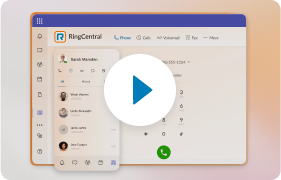This is article #1 of 7 in the series on optimizing insurance innovation and productivity through AI and cloud communications.
Digital transformation is impacting the insurance industry in multiple ways. Advanced analytics, generative AI, machine learning, and various other technologies are changing how the industry serves its customers. These new technologies are also changing the way employees work and serve their policyholders and agents.
Hybrid and remote work make their mark
The past decade has seen a marked increase in remote and hybrid work. Many employees have never looked back, preferring hybrid or work-at-home opportunities over traditional office environments. Companies that offer such flexibility have a natural advantage over their competitors when recruiting top talent. They often benefit from increased productivity as well, as employees spend less time commuting and enjoy an improved work/life balance that often leads to greater focus while on the job.
According to a report from the McKinsey Global Institute, insurance and other financial services companies stand to benefit more from remote work than any other industry sector, ranking first among 18 categories. This finding opens up new possibilities for insurers looking to enhance their operations and increase employee satisfaction.
The McKinsey study found that an estimated 75% of the time spent on activities within the insurance industry, such as analysis, claims processing, and underwriting, can be carried out effectively from remote offices without any loss in effectiveness. On the contrary, insurers stand to gain from improved employee experience, increased engagement, higher retention rates, access to a broader talent pool, and reduced operational costs.
To fully realize these benefits, insurers must equip their employees with the right technology. In an industry that heavily relies on digital communication, collaboration, and data sharing, insurers must invest in robust communications solutions that enable seamless, secure, and compliant interactions.
Essential technology for remote work in insurance
For companies that wish to fully embrace remote work, robust digital communication tools are essential. Unified Communications as a Service (UCaaS) offers frictionless collaboration for distributed teams. By integrating messaging, video meetings, and voice calls into a single platform, today’s cloud communication technology facilitates conversation intelligence across multiple channels, making it easy for insurance professionals to stay connected and fully aligned with their coworkers. The introduction of AI, which enables all of these channels to be captured, transcribed, and used for workflows, follow-ups and analysis, makes these tools infinitely more powerful and impactful.
Data sharing and security are critical in any case, but their importance is especially pronounced in the case of remote work. Operating in a highly regulated industry, insurance companies must go the extra mile to protect sensitive and confidential information. That means having technology solutions designed with security and regulatory compliance in mind, offering end-to-end encryption and comprehensive security controls to protect privacy. This allows insurance companies to confidently share documents, process claims, and manage underwriting tasks without compromising on security or compliance.
The transformative impact of AI in communications
AI is dramatically changing the way work gets done in the insurance industry. For example, AI can streamline customer service by automatically routing calls to the agents best suited to handle specific issues. AI can generate real-time transcripts and perform sentiment analysis to help agents respond more empathetically to policyholders’ concerns. In claims processing, AI can quickly analyze large volumes of data to identify patterns or anomalies, speeding up the claims resolution process. Similarly, underwriting can benefit from AI tools that assess risk more accurately by analyzing historical data and predicting future trends. These innovations improve efficiency and accuracy and free up employees to focus on more strategic, value-added activities.
RingCentral’s cloud-based communications platform is infused with powerful AI technology, bringing conversation intelligence to your workforce, wherever they are located. Imagine that your team uses RingCentral’s video meetings for their weekly planning call. When a member of the group misses a call, AI-driven notes and summaries can bring them back up to speed. If a new member joins the group, AI can catch them up on the last six weeks of meetings in very short order.
Best of all, RingCentral’s AI is secure and private, fully complying with industry standards like GDPR, GLBA, and similar regulations. We never use our customers’ data to train our AI models, nor do we allow our third-party partners to do so. Our entire product suite is built on privacy-first design principles, for fully trusted AI.
How Brightway Insurance empowered remote workers
Brightway Insurance, one of the largest privately owned independent personal lines insurance agencies in the United States, faced the challenge of managing a large, geographically dispersed team while handling a high volume of customer calls. Initially, company leaders planned to invest in a costly new contact center. Not only would that have required large capital outlays, it would also have created an ongoing cost center, with limited capacity for scaling up or down.
Brightway Insurance found a more efficient, agile, and scalable solution by supporting remote call center functions, enabled by RingCentral’s UCaaS platform. The company deployed RingCentral RingEX for messaging, video, and phone; and RingCentral Contact Center to support various customer service functions.
RingCentral offered all the communication and collaboration tools Brightway needed, with full support for remote employees. With features like team messaging, smart call routing, and omnichannel integration, Brightway employees are now better connected and more equipped to serve their expanding customer base. RingCentral’s high-security platform ensures ongoing compliance with privacy and data security regulations. The company can more easily recruit new talent, and its existing employees benefit from greater flexibility and work/life balance.
Brightway found a way to scale up its business while improving the quality of customer service, and without investing in a costly new call center. (Read the full case study here.)
As the insurance business landscape continues to undergo rapid change, fueled by new technologies, it is essential that companies find ways to increase agility, efficiency, and scalability. Effective communication and collaboration are central to that innovation process. By embracing cloud-based communications, insurance carriers can jumpstart that process and stay ahead of the competition.
Want to learn more? Explore our solutions for insurance today.
Originally published Oct 16, 2024












